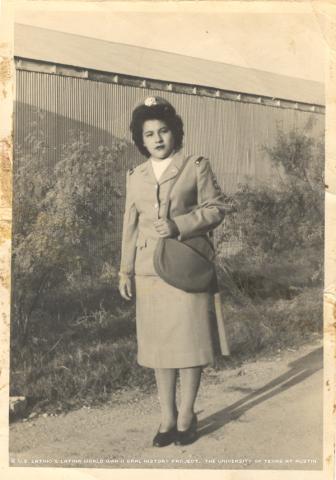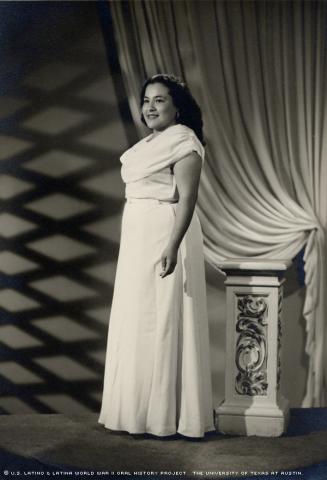

By Emily Cox
Florence Gonzales Gonzalez set a strong example for her siblings and coworkers throughout her life with her hard work and efforts toward perfection.
“I became a Mrs. how-you-do-it,” said Gonzalez, recalling how she took care of her siblings.
Gonzalez was born Telesfora Barbara Gonzales on Feb. 20, 1927, in San Antonio, Texas, to Florencia Vasquez-Valdez Gonzales, a homemaker, and José Gonzales, a brick mason and general contractor. Teachers at Gonzalez’s school couldn’t pronounce Telesfora, so they began calling her “Florence.” As a result, she has been known as Florence throughout her life.
Gonzalez was the fourth of nine children, two of whom died as infants. Her parents divorced when she was between 13 and 14 years old. Later, when Gonzalez’s mother became ill, Gonzalez was asked to become the bread-winner for the family and help take care of the five younger children.
From growing up, Gonzalez best remembers her mother’s strictness and high work standards. For example, cleaning chores were followed by a finger test to make sure it was done right. Her mother taught all of her children about cleaning and keeping the small garden they had beside their house. That demand for perfection stayed with young Gonzalez and later helped her in her career.
Gonzalez graduated from Edison High School in San Antonio in 1943. But her mother discouraged her from going beyond that level, Gonzalez says, even telling her right before she died of congestive heart failure in 1946: “You don’t need so much education.”
Gonzalez didn’t listen, however, enthusiastically pursuing an education throughout her lifetime. Her teachers recognized her as a bright student, partially, she says, because she was bilingual. She did well in her studies, but was always critical of her penmanship. Also in school, she played trumpet in band. She wanted to play the instrument better, but it was too loud to practice at home around her ailing mother.
As her mother’s health worsened, Gonzalez started working more in nursing and babysitting. She still wanted to pursue a higher education, but she needed the money to help her family.
“I wanted to be independent. I wanted to see the world. I wanted to enter the service,” Gonzalez said.
So she signed up for the United States Cadet Nurse Corps, which, according to the Web site of the American Association for the History of Nursing, was established in 1943 by Congress to help fund nurse-training programs. Between July of 1943 and June 30, 1948, nursing schools graduated 124,065 nurses under the Cadet Nurse Corps program.
By the time Gonzalez was done with her training, however, the war was over.
When she worked, she says she learned as much as she could about nursing from her supervisors and general practice. She worked hard and for long hours, and recalls being allowed to practice many procedures, quickly becoming a skilled, registered nurse.
“At night I never sat down,” Gonzalez said. “And since I was bilingual, they’d ask me for everything.”
But she says she loved it. Among other tasks, she helped with intravenous procedures, sterilizations, injections and translation services. Gonzalez recalls many of the Anglo nurses becoming unfriendly toward her because, she speculates, they didn’t like to see a Mexican American doing better than they were. But she knew how to defend herself, and said she “didn’t take nothing from nobody.”
Gonzalez remembers precisely where she was on D-Day: in the orthopedic ward at Brackenridge Hospital in Austin, Texas. She says she also did volunteer work at Fort Sam Houston at the time, reading letters to soldiers at Brooke Army Medical Center.
Family was always important to Gonzalez. Before she married, she recalls meeting up with her adopted brother Floyd on weekends to go to the movies. Also, her little brother Richard, also known as “Dicky,” would call her once a week and talk to her for two hours.
Whenever Gonzalez was working – whether it was at Brackenridge or, later, Trinity Hospital, Saenz Clinic and Santa Rosa Hospital, all in the San Antonio area – she says she enjoyed the self-satisfaction of a strong career. She added, however, that “It was all for my family.”
Gonzalez says she sometimes ran into her father at the hospital, as the police would bring him there when he was heavily intoxicated. Since she dealt with many late-night emergencies, she says she knew the local law officers well, so she’d tell them to take her keys and put him in the backseat of her car so he could sleep it off. Gonzalez’s father died of alcoholism in 1977.
She thought she’d never get married, but at 27, she married one of her old friends, Julian Gonzalez. In taking her husband’s last name, she only changed the last letter of her surname: from Gonzales to Gonzalez. She surmises that one spelling was from Spain and the other from Mexico.
The couple had three daughters – Diane, Barbara and Julianna – and Gonzalez says she raised them with the same lessons she learned from her mother.
Although both of her parents were fluent in Spanish and English, Gonzalez says Spanish was her first language growing up. She chose English as the dominant language in her home, however, because she says she knew her children needed to know English for school.
Carrying on the health-care tradition Gonzalez started in her family, one of her daughters, Julianna, graduated from Incarnate Word University and became a nurse. Gonzalez says she has noticed the situation of Mexican Americans gradually improving as her children and grandchildren grow.
“Opportunity is open to them. All they have to do is take advantage of what is offered to them, or they have to decide to do their own thing. Nothing is holding them back,” Gonzalez said.
Mrs. Gonzalez was interviewed in San Antonio, Texas, on August 2, 2006, by Raquel C. Garza.

